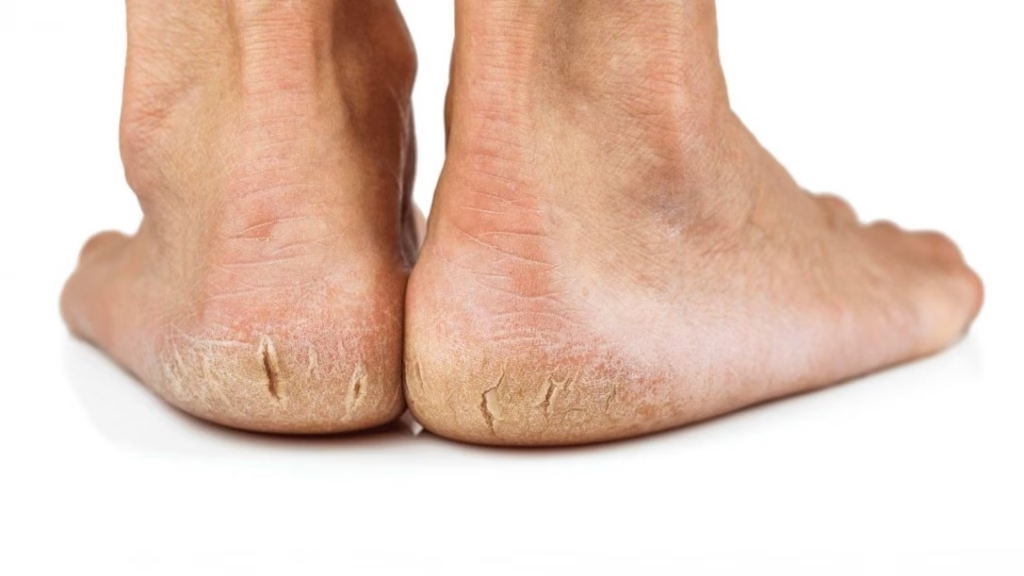
How to Heal Cracked Heels Naturally: Home Remedies, Symptoms, and Treatment Tips
Cracked heels are a common problem, especially during winter. When the weather turns cold and dry, feet often become rough, chapped, and sometimes painfully cracked. If you want to keep your heels smooth and healthy without harsh chemicals, natural remedies and homeopathic treatments are your best options. This guide explains why heels crack, how to notice it early, and what simple solutions you can try at home.
Causes of Cracked Heels
Dryness Due to Weather Conditions
Winter’s cold air and low humidity pull moisture from your skin. This dryness makes the skin on your heels stiff and prone to cracks. The lack of moisture reduces elasticity, causing the skin to peel and split.
Neglecting Foot Care
Many ignore their feet or forget to moisturize regularly. Walking barefoot on rough surfaces or not cleaning and drying feet properly can worsen the problem. Shoes that don’t fit well or are too tight increase friction, making cracks worse.
Underlying Health Issues
Conditions like diabetes, eczema, or psoriasis can make skin more sensitive and prone to cracking. Poor blood circulation and nutritional deficiencies also slow down healing, making cracks last longer.
Excessive Pressure and Friction
Wearing high heels or tight shoes for hours puts pressure on the heels. Continuous rubbing damages the outer layer of skin, causing deep fissures and pain.
Symptoms and Signs of Cracked Heels
Visual Indicators
Cracked heels often look rough, with uneven skin patches. You may see peeling or deep lines in the skin, sometimes with bleeding if the cracks are severe.
Physical Discomfort
Cracks can cause pain while walking or standing for long periods. The skin may be red, inflamed, or itchy. If ignored, cracks deepen, making walking uncomfortable.
Severity Levels
Sometimes, cracks are just minor dryness. Other times, deep fissures develop, bleeding and causing sharp pain. Recognizing the difference helps decide the right treatment.
Home Remedies for Cracked Heels
Hydration and Food Tips
Drinking plenty of water keeps your skin hydrated from within. Eating fruits, vegetables, nuts, and oils provides essential vitamins and healthy fats that boost skin health.
Foot Soaking Techniques
Soak your feet in warm water with salt, turmeric, or lemon for 10-15 minutes daily. Soaking softens dead skin and prepares it for easier removal.
Moisturization Strategies
Apply natural oils like coconut, castor, or mustard oil before bed. Cover your feet with socks overnight to lock in moisture. Regularly moisturizing prevents cracks from forming or worsening.
Natural Nuskhe for Cracked Heels
You can use honey or milk directly on your heels to aid healing. Neem oil and turmeric paste are also excellent antiseptics that reduce infection risk.
Additional Tips
Avoid walking barefoot on rough surfaces. Use a pumice stone or sugar scrub to exfoliate dead skin gently once a week. This keeps your heels smooth and prevents buildup.
Cracked Heels Cream
Cracked heels cream are also prevent pain and roughness of the heel.
How to Heal Cracked Heels Naturally by Homeopathy
Why Choose Homeopathy?
Homeopathy offers natural healing with fewer side effects. Remedies are chosen based on your specific symptoms and overall health. They encourage your body to recover from inside.
Key Homeopathic Remedies
Sulphur
Great for very dry, rough skin that itches persistently. Use in 30 or 200 potency twice daily for best results.
Petroleum
Ideal if cracks are deep, with peeling skin and foul smell. It works well when heels are extremely dry and everyone feels cold.
Nitrate of Silver (NITRIC ACID)
Use if cracks bleed after injury. It speeds up healing and reduces pain.
Graphites
Helpful for cracked, inflamed heels with sticky, mucus-like discharge. Also used if constipated or skin is very chapped.
Usage Tips
Always consult a homeopath to get the right dosage. Usually, once or twice daily is enough. Follow their advice for best results.
Preventive Measures and Lifestyle Tips
Skin Care Routine
Moisturize daily with natural oils, especially before sleeping. Use gentle soaps that don’t strip away natural oils. Avoid harsh chemicals.
Footwear Recommendations
Wear comfortable shoes that fit well. Avoid tight or high-heeled shoes for long hours. Choose breathable materials to reduce sweating.
Daily Foot Care
Wash your feet regularly, dry thoroughly, and exfoliate weekly. Nightly application of oils keeps skin soft.
Additional Lifestyle Tips
Stay well-hydrated and eat balanced foods rich in vitamins. Manage underlying health problems like diabetes or skin conditions. These keep your feet healthy.
Conclusion
Cracked heels can be painful but are easy to treat naturally and with homeopathic remedies. Regular foot care, staying hydrated, and using simple natural oils can make a big difference. Remember, prevention is better than cure—so take care of your feet daily to avoid cracks in the first place. If cracks are deep or bleeding, consult a healthcare professional or a homeopath for targeted treatment. Keep your heels smooth, soft, and healthy with these easy tips!




